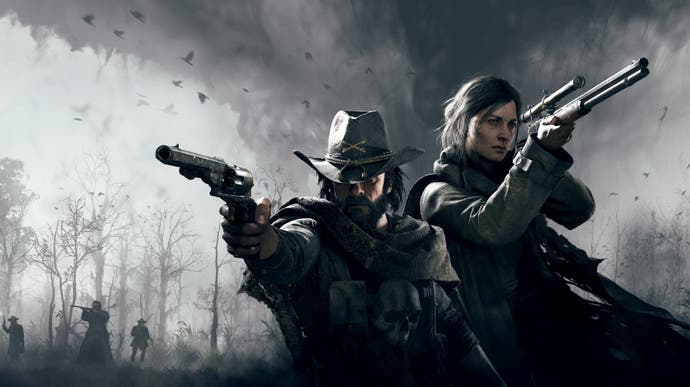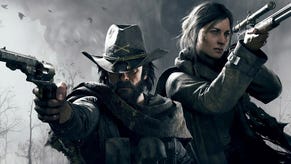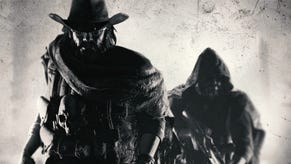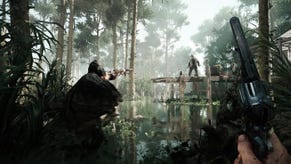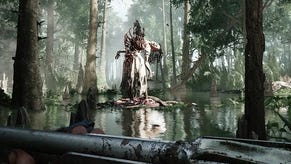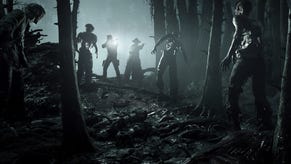Hunt: Showdown is the game that's better when you're bad at it
It's quietly Crytek's best game ever.
An assassin made of insects and knives shrieks somewhere in the dilapidated church behind me. I'll deal with that in a minute, for now I need to focus on something even more terrifying: a man with a rifle. Moments before, he'd landed a headshot on my partner before disappearing back into the treeline. We think he was alone - but you can never be too sure. By now, he could be anywhere, but I'm banking on him being exactly where I would be: cowering in a bush, healing, reloading, and getting ready to emerge again. If he isn't, aiming out the window at this bush will prove very foolish of me. Every passing second, that possibility weighs heavier. Another moment passes, and - there he is, crouch-walking from one bush to another, rifle raised, but not pointed in my direction. I have him dead to rights.
I take the shot.
I miss.
He spots me and shoots back.
He misses.
What proceeds is a lengthy and tense sniper battle, ending with a panicked up-close duel with our sidearms in the mud by my friend's body. The distance closed after neither of us proved particularly proficient with our rifles. This encounter could have ended sooner. If I'd predicted his movements better I could have caught him in retreat, if I'd counted his shots I could have been ready to move in when he was empty, or if I'd simply landed my first shot when he emerged from the treeline, none of this would have happened.
But I wouldn't have it any other way.
In Hunt: Showdown, every missed shot makes the situation more interesting, trading the advantage of an ambush for the level playing field of a shootout, every slow reload is your enemy's opportunity to grasp the upper hand. This vulnerability fuels the game's core tension: it's a game that's better when you're bad at it. I've seen what being good at this game looks like - there's no shortage of pro-players streaming on Twitch, capable of distinguishing their enemy's exact location from 100 metres away then headshotting them without breaking a sweat. But I wouldn't trade their skill set for mine. Sweating is the point.
It's one of the most distinct multiplayer FPS games out right now, and it's quietly Crytek's best game ever. The Steam page describes it as a "thrilling, high stakes PvPvE first person shooter", but what does that really mean?
Here's the Hunt: Rundown. You and your small team spawn at the edge of a 1km square slice of Louisiana swampland, armed with period-appropriate 1892 weaponry. Your task: to locate and kill a monster that lurks in a compound somewhere on the map. Once you've taken this bounty, you must escape. The catch is that up to eleven other players in teams of up to three are competing for the same bounty. If there's only one bounty on the map, you can safely assume that everyone in the game will at some point be converging upon the same monster. That's a tough situation, but you can at least plan for it. If there are two bounties on the map, it's anyone's guess what you'll be up against.
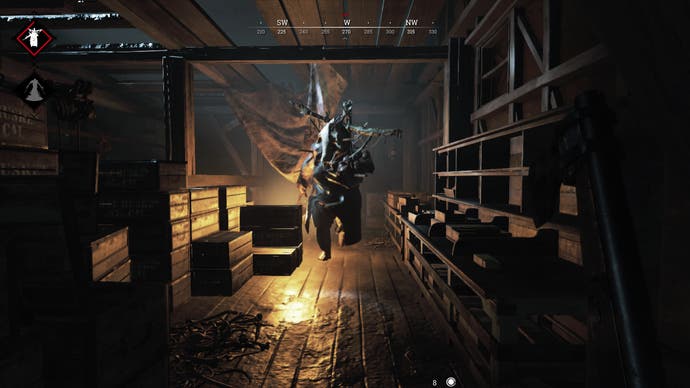
You may arrive at the bounty's lair to gunshots and explosions, a team already inside fighting. You could fend against both, or set up an ambush somewhere outside. If you're first on the scene, you could lay an ambush for other players, or perhaps you'll fall into an ambush yourself. It's easy to get lost in the variables, every bush could hide enemy players, every gap in the wood panelling of a barn could conceal a patient sniper, every twig that snaps beneath your feet could reveal your location. Whatever you do, don't startle the crows.
Many of these same tensions birthed the battle royale genre and were popularised by Playerunknown's Battlegrounds. The success of PUBG could have been an opportunity for the games industry to recognise that mainstream audiences are ready for more complex stakes in their games, a case that could even be strengthened by the recent rise of trust-testing games like Among Us. Instead, modern battle royales like Fortnite, Call of Duty: Warzone and Apex Legends have worked to minimise those tensions as much as possible in favour of something faster and simpler. This direction for the genre is not misguided, obviously, the numbers will tell you that much, but it is a departure from much of what made the genre appealing to begin with.
Hunt: Showdown is not a battle royale, but it's uncompromisingly doubling down on these frictions. It rewards careful, attentive and tactical play, yet weaves its most memorable moments from our biggest mistakes. It's for this reason that the game's community has steadily grown since its 2018 release, prompting Crytek to continue support with regular feature updates. A new map and boss monster were added last year, events rotate regularly, and new weapons were added as recently as last Thursday. It's a steady trickle, not on par with the relentless seasonal content we see for Warzone or Apex Legends, but it doesn't need to be. It's a game committed to being more complicated than the standard "last man standing" power fantasy, and that complexity leads to inevitable variety. No two matches of this game tell the same story, and fundamentally, these are stories worth telling.
Inevitably, the intricacy that sets it apart from its peers also makes it a game that's difficult to learn and even harder to be good at... but honestly, you're better off not being all that good at it.
